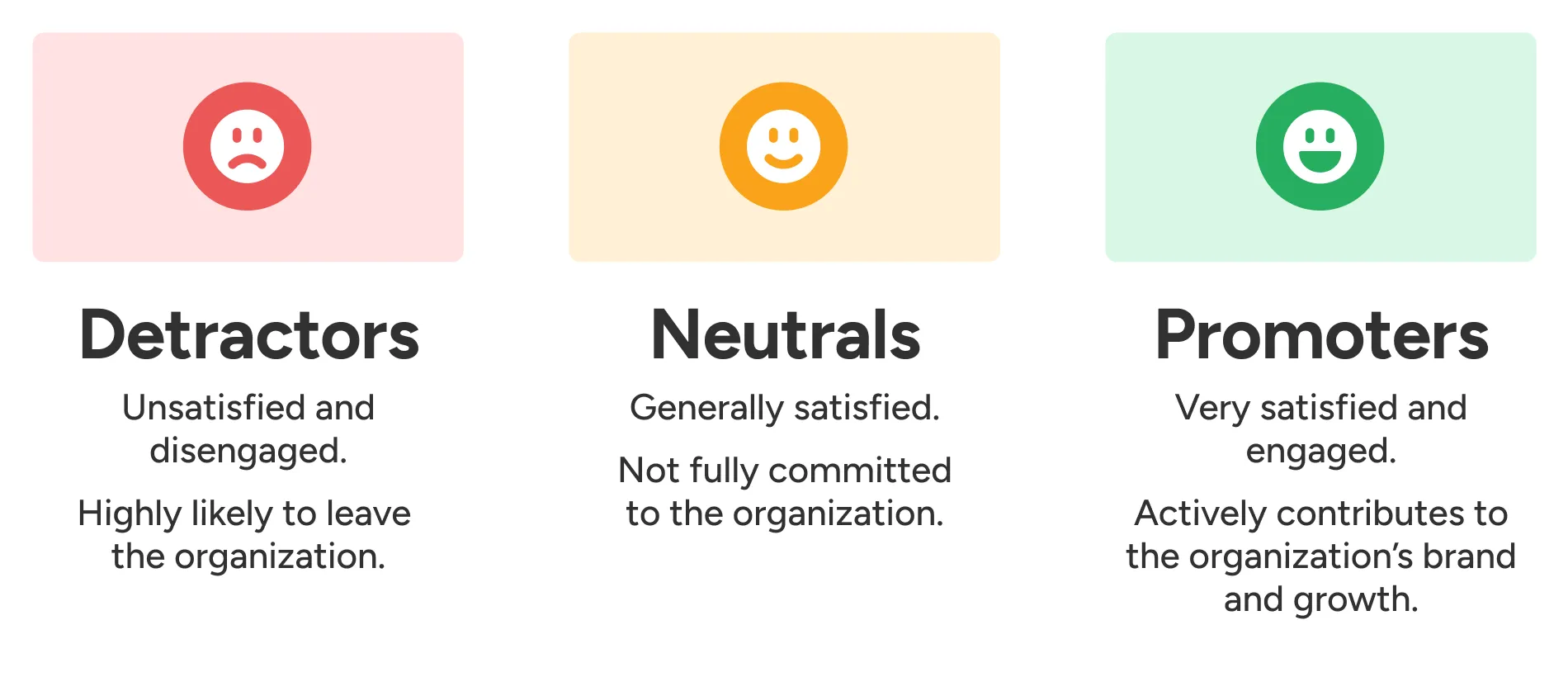Employee Net Promoter Score (eNPS) Explained
Culture
January 30, 2024
Taryn Hart
X min
Culture
January 30, 2024
Taryn Hart
X min

This one simple question offers huge insights into your organization. Your Employee Net Promoter Score (eNPS) calculates employee loyalty, and can also be a key indicator for measuring your employee experience. HR leaders are using eNPS as a starting point to improve their company culture – let's take a deeper look at what this number means.
An Employee Net Promoter Score (eNPS) is a scoring system designed to help employers measure employee satisfaction and loyalty within their organization. It comes from the Net Promoter Score (NPS)®, published by Fred Reichheld, which measures product and brand loyalty with customers. If NPS® is a successful way to measure customer loyalty, then why not use the same method to measure employee loyalty?
eNPS is determined by how your employees answer a variation of the question, “how likely are you to recommend working at [your organization] to a friend,” with answers based on a number scale from 1-10.
Employees who answer in the 0-6 range are considered Detractors, 7-8 are Neutrals, and 9-10 are Promoters.

It’s well known that employee engagement contributes to performance – organizations with a highly engaged workforce are 23% more profitable. Measuring your employee engagement through eNPS is a great start, and your results will help you design initiatives to turn your Neutrals and Detractors into Promoters.
An eNPS score reflects an organization’s employee experience and engagement levels. Engaged employees are highly motivated and move an organization forward because their needs are being met, they have a sense of belonging, and they know their wellbeing matters.
Rebecca Lee, Director of People at Kudos talks about the importance of eNPS, especially when focusing on culture, as it gives a view into your employee experience.
“It’s an important metric that not only gives us some feedback on how team members are feeling but encourages us to shift our mindset to approach team members as clients – particularly as we plan for programs and tactics that will have a positive impact on engagement, retention and overall satisfaction.” - Rebecca Lee, Director of People at Kudos
Calculating your eNPS is a great way to collect anonymous employee feedback. Employees who are satisfied and feel optimistic about their work and the organization they work for, will be more productive and innovative, and will most likely be Promoters in your eNPS. Through Kudos Pulse Surveys, conducting an eNPS survey is simple and effective and a great way to gain a complete picture of your organizational health.
Calculating your eNPS is very simple – eNPS is the percentage of Promoters minus the percentage of Detractors (Neutrals are not included in the calculation).

Here is an example:
Your organization has 100 employees, and you ask them to rank how likely they would be to recommend working at your organization from a scale of 0-10:
30 people answered with a number from 0-6 (Detractors), 20 people answered with either 7 or 8 (Neutrals), and 50 people answered with either 9 or 10 (Promoters). Neutrals are excluded from the calculation:
eNPS = 50% (Promoters) - 30% (Detractors)
eNPS = 20% (or +20 on the ENPS scale)
It’s important to note the score is not out of 100, it’s a scale that ranges between –100 to +100.
Having a positive eNPS means you have more Promoters than Detractors which is always the goal. It’s difficult to narrow down what is considered a great eNPS score, because they differ between industries, but usually +20 would be considered good, and anything above +50 is considered exceptional.
Exploring the benchmarks in your industry is a good starting point when analyzing your score, as well as researching companies that are known for having a great eNPS score.
Hubspot, at one point, reported an eNPS score of +91! Hubspot continually raises the bar for employee experience – in 2022 they were named a Best Workplace for Millennials by Fortune.
Looking into the practices that organizations with high eNPS are taking is a great way to strategize how you can improve your employee experience.
CAAT Pension Plan, a Kudos client since 2020, has made huge strides with keeping their employees engaged and has led them to become an award-winning organization. Read more about CAAT Pension Plan’s approach to recognition culture in our free case study; CAAT Sees Improved Employee Engagement by Putting Values First.
Your eNPS can be a valuable metric, however it doesn’t give insights as to why your employees responded the way they did. Taking the steps to gather valuable feedback from your employees is crucial when wanting to improve your employee experience.
For HR leaders, it’s critical to understand your culture’s performance. The key to improving your overall employee experience in your workplace is being aware of it, and making actionable changes before it’s too late.
Designed to be quick and simple, Kudos Pulse Surveys enable employees to give feedback effortlessly. This powerful data provides a better understanding into your company culture initiatives, converting survey data into meaningful insights.
Utilizing these insights enables organizations to boost employee engagement, cultivate a better workplace environment, and push towards more positive transformation.
Collecting feedback is a great start, but it's critical to share the results with your employees along with what actions and initiatives will be taken to make improvements.
Look for common threads to identify potential issues and use those insights to move forward with a strategic plan to enhance your employee experience. How your organization changes to improve your overall employee experience is the path that will positively impact your people, and your business.
Happy employees equal productive employees. Employee recognition is not only good for a company’s morale, but it's also good for business growth. Studies from Gallup have shown that happy and engaged employees lead to increased productivity and profitability. Kudos streamlines recognition and helps create an environment where employees feel appreciated through regular and meaningful recognition, which can directly impact your eNPS.
You can download our free guide, Making the Case for Employee Recognition, which will walk you through the steps to get approval of your employee engagement strategy.
Try not to be alarmed if your organization has more Detractors and Neutrals than Promoters – instead, take it as a crucial opportunity to pause on your organization's current practices, and analyze what needs to change. Listen to your employees, advocate for them, and determine your plan to turn Detractors and Neutrals into Promoters.
Launching the right initiatives will help you emerge as a leader in company culture, but investing in the right tools, like Kudos, to make it happen is key.
Originally published February 2023. Last updated January 2024.

A newsletter with the best resources for HR professionals.


Building a Winning Talent Strategy Through Irresistible Culture
Get Your Guide